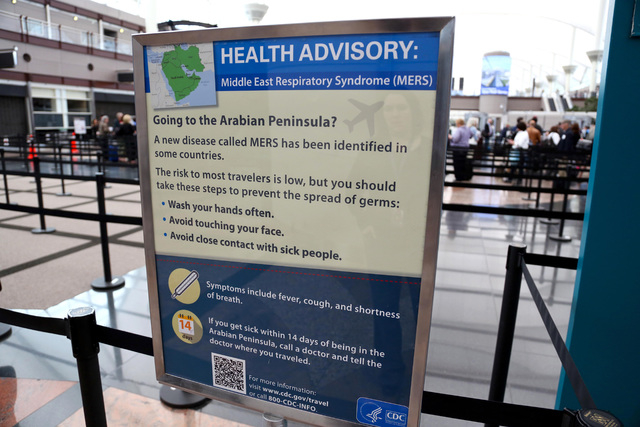CDC tells airports, including McCarran, to post MERS warning

Signs in McCarran International Airport that advertise to tourists the shows they might want to attend in Las Vegas have been joined by a poster from the Centers for Disease Control and Prevention that warns travelers about a MERS virus they should stay away from.
The new sign provides information about Middle East Respiratory Syndrome, or MERS, a virus originated in Saudi Arabia that has been spread rapidly by travelers to seven countries, infecting nearly 600 people while killing 171 of them. The CDC signs also have been placed in 21 other airports across the nation known to have heavy influxes of tourists.
According to the CDC, there have been two confirmed cases in the United States of MERS, which can cause acute respiratory illness, with symptoms of fever, cough and shortness of breath. Government health officials say one traveler found to have the virus in Indiana has recovered fully and a second, discovered in Orlando, Fla., earlier this month, is still hospitalized.
Linda Verchick, disease surveillance supervisor for the Southern Nevada Health District, said there are not any suspected cases of the virus in Las Vegas. She noted that there are no travel advisories at this time and suggested that people who have traveled to the Middle East, or who have friends who have traveled there, keep aware of symptoms of the virus.
Physicians and emergency rooms are being issued a technical bulletin through the state that includes how to test for the virus, Verchick said.
Chris Jones, an airport spokesman, said government authorities ordered the sign placed in terminals at McCarran earlier this week and he noted that the Las Vegas airport does not have direct flights from countries that health officials warn can be particularly problematic.
Airline crews working flights from Saudi Arabia, Israel, Syria, the United Arab Emirates, Yemen, Lebanon, Qatar, Oman, Lebanon, Kuwait, Iran, Iraq and the Palestinian territories have been asked to report to the CDC any passengers feeling feverish or who have coughs and difficulty breathing.
Dr. Ion Alexie, an infectious disease specialist at Valley Hospital, said there is no drug therapy for the virus. Medical care is supportive, aimed at helping relieve symptoms. He said not all people exposed to the virus become ill, but of those who do, about 30 percent to 35 percent die, many of whom apparently are immunocompromised.
Alexie said the virus, also found in camels and bats, spreads through close person-to-person contact, generally through relatives or health care workers.
“The story on just how serious MERS is” remains to be written, said Dr. Alan Greenberg, an infectious disease specialist at University Medical Center. “We don’t really know at this time.”
Patients brought to UMC who are suspected of having MERS would be subject to the strictest infection control methods, he said.
MERS-CoV, known to researchers as a beta coronavirus, was first reported in Saudi Arabia in 2012.
It is not the same coronavirus that caused SARS, or severe acute respiratory syndrome, in 2002, though, like SARS, MERS is most similar to coronaviruses found in bats.
The CDC reports it is trying to identify the possible role that bats and camels and other animals may play in the transmission of MERS.
To help prevent respiratory illness, the CDC said people should wash their hands often for at least 20 seconds with soap and water.